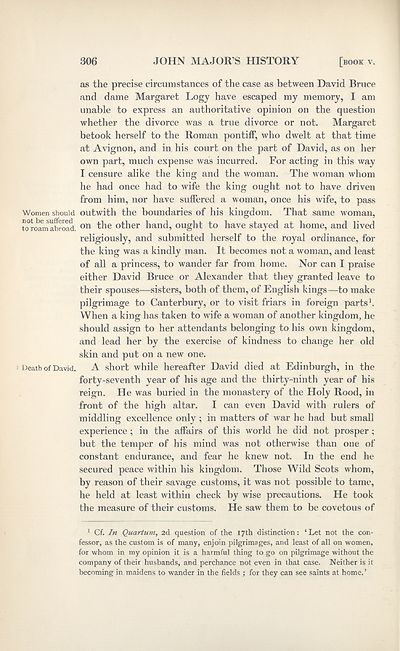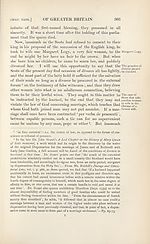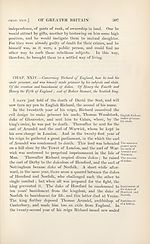Series 1 > History of Greater Britain, as well England as Scotland
(451) Page 306
Download files
Complete book:
Individual page:
Thumbnail gallery: Grid view | List view

306
JOHN MAJOR’S HISTORY
[book V.
as the precise circumstances of the case as between David Bruce
and dame Margaret Logy have escaped my memory, I am
unable to express an authoritative opinion on the question
whether the divorce was a true divorce or not. Margaret
betook herself to the Roman pontiff, who dwelt at that time
at Avignon, and in his court on the part of David, as on her
own part, much expense was incurred. For acting in this way
I censure alike the king and the woman. The woman whom
he had once had to wife the king ought not to have driven
from him, nor have suffered a woman, once his wife, to pass
Women should outwith the boundaries of his kingdom. That same woman,
"oroTmabroad. on ^ie other hand, ought to have stayed at home, and lived
religiously, and submitted herself to the royal ordinance, for
the king was a kindly man. It becomes not a woman, and least
of all a princess, to wander far from home. Nor can I praise
either David Bruce or Alexander that they granted leave to
their spouses—sisters, both of them, of English kings—to make
pilgrimage to Canterbury, or to visit friars in foreign parts1.
When a king has taken to wife a woman of another kingdom, he
should assign to her attendants belonging to his own kingdom,
and lead her by the exercise of kindness to change her old
skin and put on a new one.
Death Of David. A short while hereafter David died at Edinburgh, in the
forty-seventh year of his age and the thirty-ninth year of his
reign. He was buried in the monastery of the Holy Rood, in
front of the high altar. I can even David with rulers of
middling excellence only ; in matters of war he had but small
experience ; in the affairs of this world he did not prosper;
but the temper of his mind was not otherwise than one of
constant endurance, and fear he knew not. In the end he
secured peace within his kingdom. Those Wild Scots whom,
by reason of their savage customs, it was not possible to tame,
he held at least within check by wise precautions. He took
the measure of their customs. He saw them to be covetous of
1 Cf. In Quarium, 2d question of the 17th distinction: ‘Let not the con¬
fessor, as the custom is of many, enjoin pilgrimages, and least of all on women,
for whom in my opinion it is a harmful thing to go on pilgrimage without the
company of their husbands, and perchance not even in that case. Neither is it
becoming in maidens to wander in the fields ; for they can see saints at home.’
JOHN MAJOR’S HISTORY
[book V.
as the precise circumstances of the case as between David Bruce
and dame Margaret Logy have escaped my memory, I am
unable to express an authoritative opinion on the question
whether the divorce was a true divorce or not. Margaret
betook herself to the Roman pontiff, who dwelt at that time
at Avignon, and in his court on the part of David, as on her
own part, much expense was incurred. For acting in this way
I censure alike the king and the woman. The woman whom
he had once had to wife the king ought not to have driven
from him, nor have suffered a woman, once his wife, to pass
Women should outwith the boundaries of his kingdom. That same woman,
"oroTmabroad. on ^ie other hand, ought to have stayed at home, and lived
religiously, and submitted herself to the royal ordinance, for
the king was a kindly man. It becomes not a woman, and least
of all a princess, to wander far from home. Nor can I praise
either David Bruce or Alexander that they granted leave to
their spouses—sisters, both of them, of English kings—to make
pilgrimage to Canterbury, or to visit friars in foreign parts1.
When a king has taken to wife a woman of another kingdom, he
should assign to her attendants belonging to his own kingdom,
and lead her by the exercise of kindness to change her old
skin and put on a new one.
Death Of David. A short while hereafter David died at Edinburgh, in the
forty-seventh year of his age and the thirty-ninth year of his
reign. He was buried in the monastery of the Holy Rood, in
front of the high altar. I can even David with rulers of
middling excellence only ; in matters of war he had but small
experience ; in the affairs of this world he did not prosper;
but the temper of his mind was not otherwise than one of
constant endurance, and fear he knew not. In the end he
secured peace within his kingdom. Those Wild Scots whom,
by reason of their savage customs, it was not possible to tame,
he held at least within check by wise precautions. He took
the measure of their customs. He saw them to be covetous of
1 Cf. In Quarium, 2d question of the 17th distinction: ‘Let not the con¬
fessor, as the custom is of many, enjoin pilgrimages, and least of all on women,
for whom in my opinion it is a harmful thing to go on pilgrimage without the
company of their husbands, and perchance not even in that case. Neither is it
becoming in maidens to wander in the fields ; for they can see saints at home.’
Set display mode to:
![]() Universal Viewer |
Universal Viewer | ![]() Mirador |
Large image | Transcription
Mirador |
Large image | Transcription
Images and transcriptions on this page, including medium image downloads, may be used under the Creative Commons Attribution 4.0 International Licence unless otherwise stated. ![]()
| Scottish History Society volumes > Series 1 > History of Greater Britain, as well England as Scotland > (451) Page 306 |
|---|
| Permanent URL | https://digital.nls.uk/127737177 |
|---|
| Attribution and copyright: |
|
|---|
| Description | Over 180 volumes, published by the Scottish History Society, containing original sources on Scotland's history and people. With a wide range of subjects, the books collectively cover all periods from the 12th to 20th centuries, and reflect changing trends in Scottish history. Sources are accompanied by scholarly interpretation, references and bibliographies. Volumes are usually published annually, and more digitised volumes will be added as they become available. |
|---|


